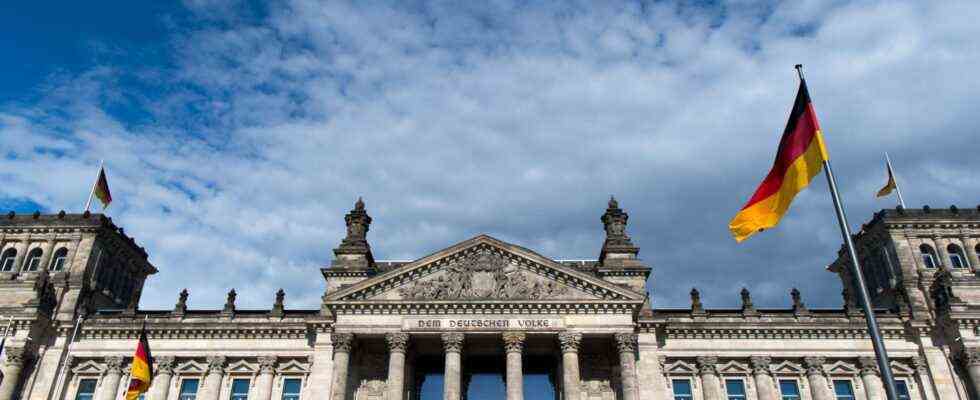As of: 07/09/2021 9:03 a.m.
Well over 80 parties and associations want to take part in the federal election. The Federal Electoral Committee decides whether they meet the formal requirements. There are already surprises – and criticism.
Which small parties and associations are allowed to take part in the federal election in autumn? By the afternoon, the federal electoral committee will hear all 88 applicants in Berlin. In the first round on Thursday, 21 applicants were admitted.
“I propose to recognize LOVE as a party within the meaning of Par.18, Paragraph 4, No. 2,” says Federal Returning Officer Georg Thiel. With this sentence he is free of romantic thoughts. The European LOVE party has a small German offshoot with 53 members so far. She is active in local politics in Westphalia and took part in the 2019 European elections.
There are inquiries from the committee, which includes members of all parliamentary groups and two judges from the Federal Administrative Court. For example, the question of how the group with 53 members can claim to participate in the political decision-making process of the people?
Federal Returning Officer Georg Thiel emphasizes that the electoral committee only checks the formal requirements for recognition as a party, but no questions about the content.
Image: dpa
Participation in political decision-making
Because that is one of the requirements for admission. Political parties must demonstrate, based on the number of their members or public activities, that they want to participate in the formation of political will and want to represent the people.
This year the pandemic will make matters worse. Corona has made public relations and member recruitment almost impossible, especially for young groups. That does not make the decision of the federal electoral committee “more generous, but we have to include them in our weighing up,” said Thiel. In the end, the voter has to decide at the ballot box.
DKP and Pogo party fail
If formal requirements are not adhered to, there is less pardon. The German Communist Party (DKP), which has existed since 1968, has not been approved because it has been bogging down the timely submission of accounts for years.
The APPD – the Anarchist Pogo Party of Germany – also failed. This group, which appears on the Internet with the slogan “Work sucks”, was not approved. Reason: The application for admission to the election was only sent by email and not – as prescribed – by post. The federal chairman of the APPD, Andreas Reiter, reacted indignantly. “And for that shit I had to stay sober today. Thanks for that!”
The APPD still has a chance, as does the DKP: They can lodge a complaint against the decisions of the Federal Electoral Committee with the Federal Constitutional Court within four days. The DKP chairman Patrik Köbele announced this step immediately.
Other associations that were not approved include the “Undeutsche Verein”, “MenschenRechte 100pro” or the “GERADE Party”.
Other less well-known associations such as the “Garden Party”, the “Animal Welfare Alliance”, “Volt Germany”, the “Team Todenhöfer” or “Menschliche Welt” can compete against it.
The protection of the constitution classifies “III.Weg” as right-wing extremist
Thiel emphasized that the federal electoral committee was only examining the formal requirements for recognition as a party, but not questions of content. In this way, the grouping “Der III. Weg”, classified as a “right-wing extremist small party” by the Office for the Protection of the Constitution, was allowed to vote. In the Constitutional Protection Report 2020 it says about her: “The party still serves as a catchment basin for people who belong to the neo-Nazi scene and were in some cases also members of banned organizations.”
The decision of the federal electoral committee has already caused criticism. The SPD politician and general secretary of the German-Israeli Society, Michaela Engelmeier, asked via Twitter whether the committee seriously wanted to allow an anti-Semitic and right-wing extremist micro-party.
The way is free for the Danish SSW party
SSW is also permitted. The party of the Danish and Frisian minorities in Schleswig-Holstein has not stood in a federal election for 60 years. Top candidate Stefan Seidler now sees good chances of a direct mandate: “That has to do with the fact that we are a regional party. Many people choose us and we experience that people want regional structures to be strengthened instead of more globalization.”
As a lone fighter in the Bundestag, Seidler wants to represent the economic interests of his homeland directly in Berlin and give the minorities more attention.
Great effort for approval
The effort that goes into checking and approving the small parties is completely justified, says the Federal Returning Officer. They ensured transparency and acceptance of political decisions:
“88 parties and associations that have registered, that is a lot. And we must not overburden the citizen to have to choose from maybe 200 or 300 in the end. That is why I think it is right that these few formal criteria must be adhered to. ”
The parties that are currently represented in the Bundestag or in the state parliaments with at least five members are excluded from this procedure: CDU and CSU, SPD, FDP, AfD, the Left, the Greens and the Free Voters in Bavaria and Brandenburg.
With information from Angela Tesch,
ARD capital studio
Election committee advises on small parties: LOVE is allowed
Angela Tesch, ARD Berlin, July 9th, 2021 8:46 am

